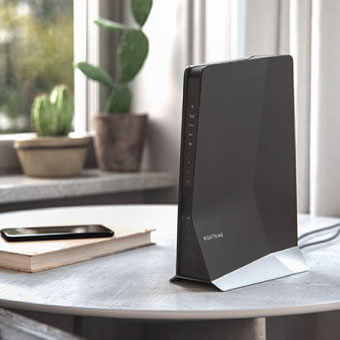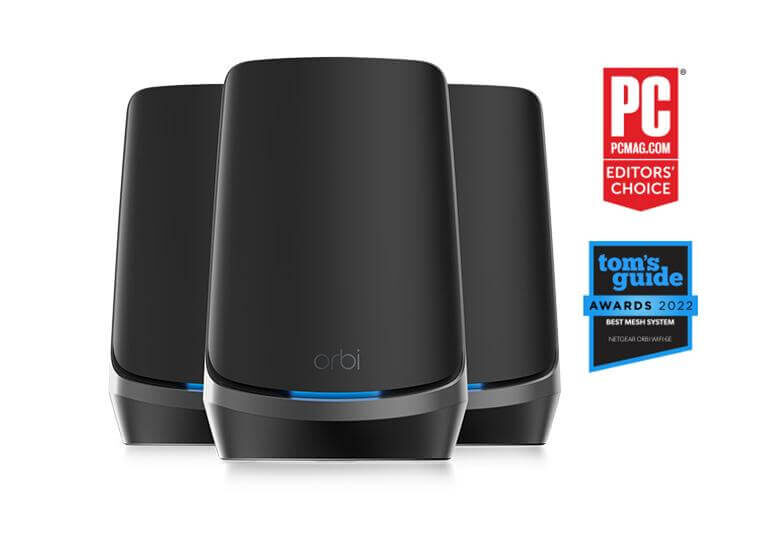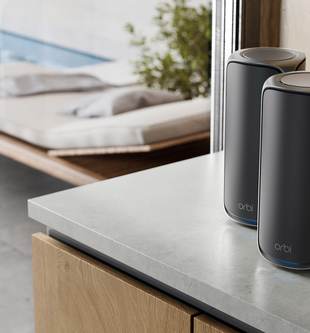WiFi Extender Vs. Mesh WiFi: Which Is Right for You?
Do you need a WiFi Extender or a Mesh WiFi System? Read on to learn their pros and cons – both designed to improve WiFi connections in your home. They both in different was, here we explain the difference between the two.IN THIS ARTICLE
When A Router is Not Enough...
According to PEW Research Center report, 93% of American adults use the internet. And the best way to ensure everyone is connected is by installing a WiFi network at home.
A good WiFi signal is essential whether you’re streaming movies, browsing the web, or playing games online. But what do you do if your signal is weak or spotty? You could try a WiFi extender or switch to a mesh WiFi system. If you’re like the ordinary consumer, you don’t know much about either or which will serve you best.
In this article, you’ll find a comprehensive comparison between mesh WiFi vs. WiFi extenders and help you decide which one is right for you.
What is a WiFi Extender?
A Wi-Fi extender is one simple device that extends your Wi-Fi signal by rebroadcasting it further into your home. Wi-Fi extenders are also sometimes called Wi-Fi ‘boosters’, or ‘repeaters’, but they mean the same thing – they extend your Wi-Fi signal coverage. You have to manually switch from your home router’s Wi-Fi network to the extender’s Wi-Fi network.
Wi-Fi extenders usually connect to your home router via Wi-Fi, but certain models also allow Ethernet or Powerline connections. Extenders are good for:
- Bringing Wi-Fi to rooms out of reach of your router’s signal.
- Removing signal dead zones.
- Having two separate networks, one for your router, one for the extender.
Learn how configure with our setup guide for WiFi Extenders.


What is Mesh WiFi?
Mesh Wi-Fi uses multiple devices around your home to create one seamless network. Each of these is called a ‘node’ and they all work together to extend your Wi-Fi signal to your whole home. One node usually connects to your home router via Ethernet cable, and the rest of the nodes are placed around your home to where you need Wi-Fi. You don’t have to manually switch to another network, the nodes automatically keep you connected to whichever node has the strongest signal, giving you seamless coverage everywhere.
Mesh Wi-Fi networks are very easy to set up, and are good for:
- Extending your Wi-Fi to your whole home or bigger offices.
- Moving around at home and always staying connected to your Wi-Fi.
- Removing all signal dead zones.

As you can see, the difference between the two is that Wi-Fi extenders are used to rebroadcast your home router’s Wi-Fi signal. The main drawback is that your devices will not switch between Wi-Fi broadcasts automatically and you experience a disconnection while switching manually.
Mesh Wi-Fi uses multiple nodes to create a single, big and seamless Wi-Fi network that covers your whole home. Your devices will connect to the closest node automatically and without any disruptions as you move around your house.
Why Choose a WiFi Extender?
Advantages
- Simple solution for extending your home Wi-Fi signal.
- Plugs straight into a power outlet.
- More affordable.
Disadvantages
- You have to manually switch over to the extender’s network.
- Not ideal for larger homes.
- Harder to configure.
Benefits of a WiFi Extender
If you’re having trouble with your connection, a WiFi extender can help. And as a WiFi solution, it also offers numerous benefits, including:
- Easy to setup
Even if you have no prior experience with a WiFi extender, installing it will be hassle-free and fast. Although you’ll have to configure it to your existing network, it’s only one device unlike with a mesh system which uses multiple devices. - Inexpensive
If you’re on a budget, WiFi extenders are an excellent choice. - Portability
WiFi extenders are small devices that you can plug in and will rebroadcast the signal as long as they can connect to your router.
Drawbacks of WiFi Extenders
Although WiFi extenders offer several benefits, there are also some drawbacks, including:
- Interference
WiFi extenders can sometimes interfere with other devices in your home – even your existing router. This is because they often use the same frequency as other devices, such as microwaves and baby monitors. - Performance
WiFi extenders are not always reliable and can often slow down your internet connection. This is because the WiFi signal must travel from the router to the extender and back out again. As a result, even if you can connect, the speeds provided might be very slow, especially if you are far away from the WiFi extender. - Has to be in the Right Position
For WiFi extenders to work properly, they must be in the right position. This can often be difficult to achieve, especially if you have a large home. - The WiFi Experience is Not Seamless
When connecting to the internet, the last thing you want is unnecessary interruption. Sadly, these are inevitable when using WiFi extenders. This is because they broadcast on a separate WiFi name. Therefore, your device will regularly connect and reconnect to your router and extender depending on which on is within range. This can cause WiFi calls to stutter or drop, or streaming to buffer and reconnect.
Why Choose a Mesh WiFi System?
Advantages
- One big, seamless Wi-Fi network for your whole home.
- No need to manually switch to any different network.
- Self-organises to keep you connected to the closest satellite with the strongest Wi-Fi signal.
- Reliable even if one satellite fails.
- Easily portable to different locations.
- Just add more satellites to increase your Wi-Fi signal coverage.
- Easier to set up and control via a phone app.
- Stylish design.
Disadvantages
- More expensive than extenders.
- Nodes don’t plug straight into the wall as extenders do.
At this stage, you’re probably wondering what is Mesh WiFi. It’s a new type of WiFi system that has become popular in recent years. Mesh WiFi systems consist of multiple devices that work together to create a single WiFi network. These systems replace your existing router with a Mesh Router and 1 or more Mesh Satellites.
Each device in the mesh network is known as an “access point” or “node.” These nodes communicate with each other wirelessly and share the same WiFi network name (SSID). Learn more about how Mesh WiFi Works.
Benefits of Mesh WiFi
As you’ve gathered, mesh WiFi can give you a better range than a WiFi extender. But that’s not all they also offer benefits such as:
- Easy to Set Up
One of the main benefits of mesh WiFi is that it is very easy to set up. After initial setup, your mesh router is ready to connect to its preconfigured satellites. Moreover, you can simply plug in the first node and then add more nodes as needed. Adding satellites is much easier than setting up multiple WiFi extenders, which each needs to be configured independently from the router.
- Flexible Coverage
Another benefit of mesh WiFi is that it offers flexible coverage. You can add or remove nodes as needed to change the coverage area. This is perfect for people who move often or have a large home or office.
- Better Speeds
Mesh WiFi systems offer better speeds than WiFi extenders because the mesh router and satellite nodes are specially tuned to create a unified network. They also cooperate by instantly handing-off connections to devices to the fastest point as they move around the home. The nodes in a mesh network communicate wirelessly, so the WiFi signal does not have to travel from the router to the node and back out again.
- Very Reliable
Mesh WiFi systems are also very reliable. This is because they use multiple nodes, so if one node is too far away or goes down, the others can still provide a WiFi signal. WiFi extenders, on the other hand, only have one device. If that device goes down, you will not be able to connect to the internet.
- Easy to Scale
As your WiFi and connectivity needs increase, you’ll have to increase capacity to match usage. This one of the things that makes mesh WiFi systems ideal as they’re easy to scale. You can simply add more nodes to the mesh network as needed. This is perfect for businesses that are constantly expanding.
- Minimizes Dead zones
Mesh WiFi systems are also good at minimizing dead zones. Dead zones are areas in your home or office where the WiFi signal is weak or non-existent. This is because mesh WiFi systems use multiple nodes that communicate with each other wirelessly. So, even if one node is in a dead zone, the others can still provide a WiFi signal.
Disadvantages of Mesh WiFi Systems
Along with the numerous benefits, mesh WiFi systems also have some disadvantages. These include:
- More Expensive
One of the main disadvantages of mesh WiFi systems is that they are more expensive than WiFi extenders. This is because they replace both your router and any WiFi extenders, so you will have to purchase a package of 2 or more devices at once. And they also tend to be more expensive than traditional WiFi routers. - Initial Setup Is More Demanding
Another downside of mesh WiFi systems is that the initial network setup is more demanding. Unlike with a WiFi extender, you’ll have to position and set up multiple devices. Therefore, it will take a bit longer but, the efficiency and reliability are worthwhile. - Might be Excessive for Slower Internet Connections
No matter how powerful your mesh system, it’s only as fast as your Internet speed. If you have a slow modem connection from your ISP already (20-30mbs), even the best mesh won’t make that any faster and it might be more cost-effective to use low-cost extenders to extend your network. - Increased Power Consumption for Each Node
In mesh WiFi systems, each node acts as an endpoint and a route, increasing the workload and strain on each. So, to work properly, each node will typically require slightly more electricity than extenders.
Which One Should You Choose?
Now that you know the difference between mesh WiFi and WiFi extenders, you might be wondering which one is right for you. The answer to this question depends on a few factors. These include your budget, your needs, and your level of expertise. If you are looking for an easy and inexpensive way to boost your WiFi signal, then a WiFi extender might be a good option.
However, if you want a WiFi network that supports higher speeds and can provide adequate coverage in large homes, a mesh network is the ideal option.
Get What Works for You
Be sure to do your research before making a decision. With the right WiFi system, you can enjoy fast, reliable WiFi in every corner of your home or office. And for this, you’ll need the right hardware provider.
This is where NETGEAR comes into play. We offer internet connectivity and WiFi solutions for home and business use. Along with mesh WiFi and WiFi extenders, we also offer mobile routers to enable internet connectivity anywhere. More importantly, our solutions come with unparalleled support to handle any connectivity issues as they arise.
So, if you need the most reliable internet connectivity, Shop mesh WiFi solutions today.






